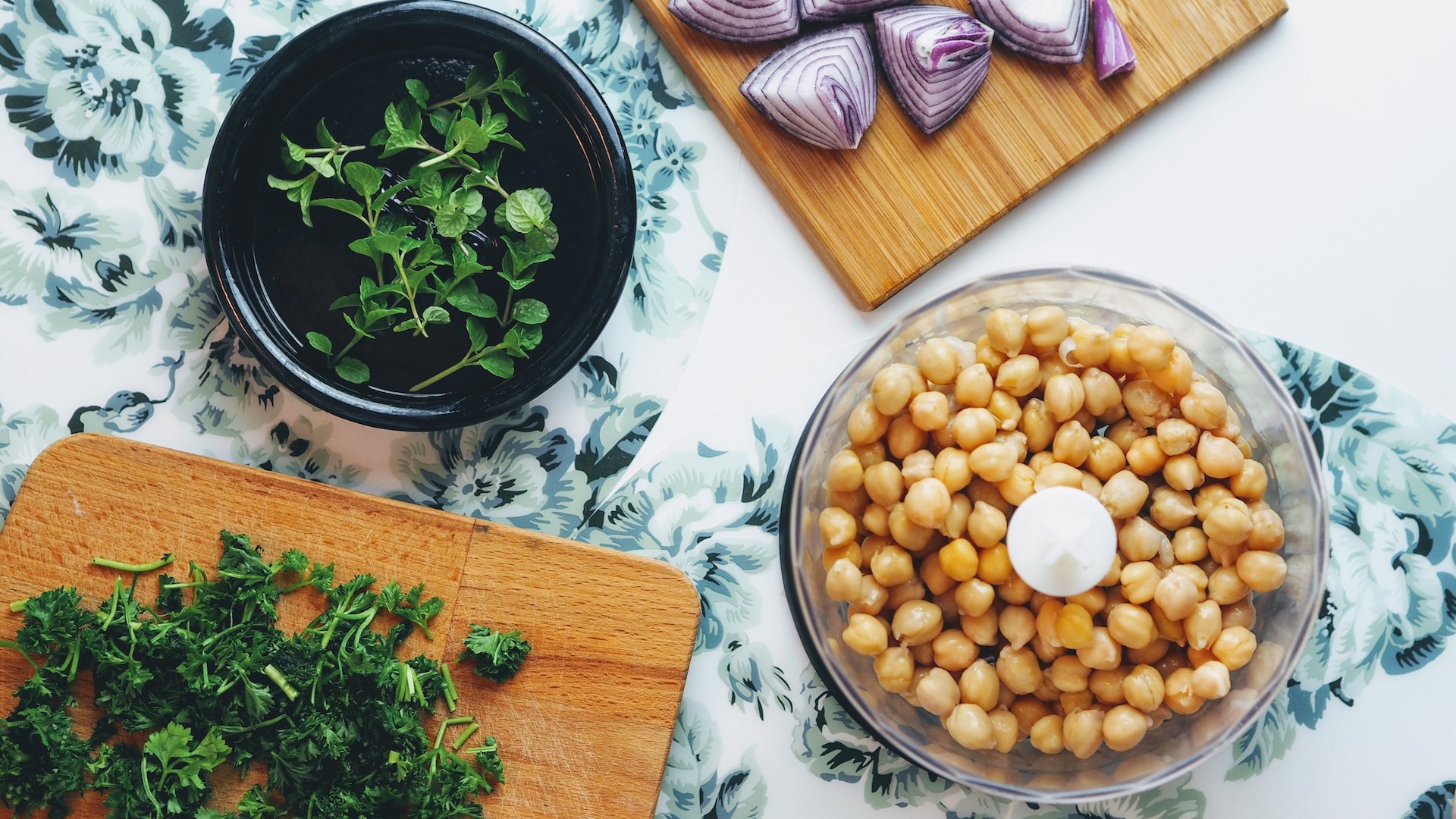 Health Resolutions
Health Resolutions  Healthy Shopping
Healthy Shopping  Live Consciously
Live Consciously
Low-Waste Living: How to Easily Transform Your Kitchen Habits
By Abby K. Cannon, JD, RD, CDNHome » Live Consciously » Low-Waste Living: How to Easily Transform Your Kitchen Habits
Maybe you’re inspired by the idea that a low-waste lifestyle could help you eat healthier, but you feel totally overwhelmed when you think about how to actually make it happen. I don’t blame you! When I first learned about zero-waste principles, I was overwhelmed, too.
But I made a commitment to protect the environment, my health, and my family’s health, so I turned that overwhelmed feeling into action. I started small, changing one habit at a time. As a dietitian, it’s no surprise that I began with an overhaul of my kitchen and food shopping habits.
Because we eat multiple times a day, tweaking food habits has a major impact. And by reducing waste in the kitchen, we tackle two issues: food waste and packaging waste.
Why Worry About Kitchen Waste?
As of 2017, food is the largest component of what Americans send to landfills, with households and restaurants being the biggest contributors. Worldwide, we waste about one third of the food produced for human consumption. Besides wasting the food, this wastes energy, land, water, and other valuable resources. If you eat healthy, you might be a serious culprit: Fruits and vegetables go to waste more than any other food group.
But wait, isn’t food biodegradable? Technically, yes. But if produce ends up in a landfill, it lacks access to oxygen and ends up breaking down anaerobically, which releases methane, a greenhouse gas that’s about 25 times more potent than carbon dioxide.
RELATED: 3 Ways to Waste Less Food, According to Tom Colicchio
Packaging is also a major kitchen issue: it makes up almost 30 percent of the waste sent to landfills. I was shocked to realize how many items in my cart were wrapped in single-use packaging—from produce bags to plastic tubs of nuts.
Luckily, there are many simple ways to drastically reduce both food and packaging waste. I’ve rounded up my top tips for revamping your kitchen and food shopping habits to reduce your environmental footprint and live a healthier life, below.
(Photos: Shutterstock)

Abby K. Cannon, JD, RD is a Nutritious Life Certified attorney-turned-dietitian who lives a very low-waste lifestyle. While practicing law in New York City, she realized her true passions were for nutrition, wellness, and the environment and so she returned to school to become a dietitian. Her food philosophy marries sustainability and nutrition. Abby’s Food Court (both the website and the practice) helps people make the best choices for their health and the environment. Stay up to date with Abby by following @abbysfoodcourt on Instagram.
-
1. Buy staples in bulk.
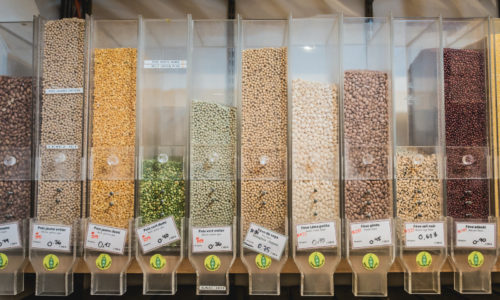
Buying in bulk is my favorite way to reduce waste. Once you get in the habit of purchasing nuts, seeds, grains, pastas, flours, and dried fruit in bulk, you’ll never go back. Here’s how to do it without using plastic bags. Pro tip: Shop at a time when it’s not too crowded.
First, invest in some jars or cloth bags and learn their “tare” weight, which is how much they weigh when they’re empty. You can usually just ask a customer service representative to weigh your containers the first time.
Next, as you fill each container, take a photo on your phone of each bulk bin, making sure to capture the SKU number (which identifies the product) and the price.
At check out, line up the containers on the counter in order based upon the order of your photos. This makes for a more seamless process. For each item, you can then nicely tell the cashier the tare weight of your container and the SKU number. He or she will deduct the tare weight so that you only pay for the food (not the container).
Don’t forget to ask if there is a discount for bringing your own containers. Whole Foods, for example, gives back 10 cents for each bag you bring. One important note: If you have allergies to nuts, seeds, gluten, or other items sold in bulk, be careful of cross-contamination. Talk with the grocery stores about their practices and, if in doubt, avoid buying in bulk.
-
2. Buy your produce “naked.”
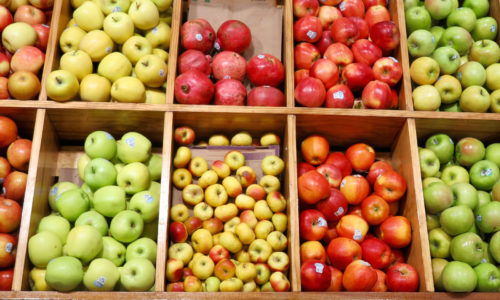
We use an estimated 500 billion to one trillion plastic bags each year, and those statistics don’t even include pre-packaged produce bags. While the average useful life of a plastic bag is only 12 minutes, they take over 500 years to degrade in landfills.
First, try to avoid buying produce that’s already been wrapped in plastic. Second, invest in reusable cloth bags to fill with loose produce (and bulk staples!).
Top tip: Even if you forget your produce bags, you can throw fruits and veggies into the cart “naked.” I promise your avocado or kale will make it from the supermarket to your house without a plastic bag. Just be sure to wash the produce thoroughly before eating.
-
3. Prep food and store it appropriately.
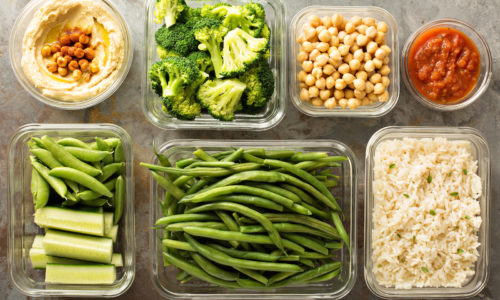
Prepping fruits and vegetables and having a clean, organized fridge makes it easier to eat empowered and also helps reduce food waste, because an overstuffed pantry or refrigerator is a recipe for wasting food.
Prepping vegetables as soon as you arrive home from shopping is game changing. You’re more likely to eat and cook them this way, instead of finding old, sad produce hiding in the back of the fridge. If you know that you never use all your herbs or produce, prep and then freeze them.
You can also get smart about storage. I keep nuts and seeds in the fridge (or even the freezer!) to prevent them from going rancid. I store grains in airtight glass jars in a cool, dry pantry; they keep for about six months.
-
4. Bring your own containers for takeout and leftovers.
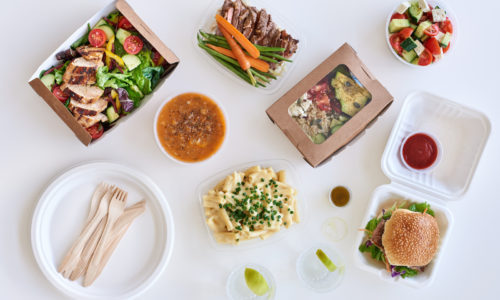
I always bring a container and a smile with me for takeout. Most places fill up my containers when asked politely. Because portion sizes at restaurants are usually much larger than I need, I also use my containers to take home leftovers.
-
5. Compost
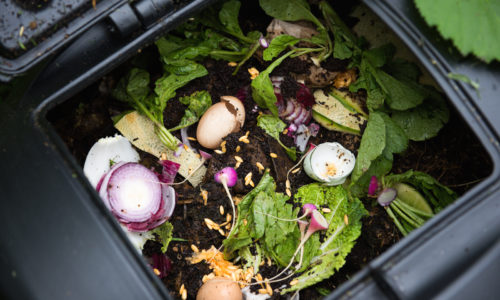
Composting diverts food from landfills and creates fertilizer for healthy soil. Compost plant-based foods, including fruit and vegetable scraps, grains, and nuts, along with coffee grinds, tea bags, and paper napkins. Avoid composting animal-based products, like meat, fish, bones, or dairy. I recommend a small stainless steel container for your kitchen counter or fridge to throw scraps into. If you’re a city dweller, once or twice a week you can drop the compost off at a local farmers’ market. In the suburbs or country, you could try a backyard compost container and use the resulting compost in your garden.
While this all sounds like a lot, remember, you don’t have to tackle it all today. Choose and commit to one tip. Once that becomes a habit, choose the next. This slow and steady pace is how I tackled reducing my waste, and it feels amazing.
About Abby K. Cannon, JD, RD, CDN
Abby is the founder of Abby's Food Court, a private nutrition practice focused on women's health and eco-friendly lifestyles.
DISCOVER MORE
RECENT ARTICLES

Want a sneak peek inside the program?
Get FREE access to some of the core training materials that make up our signature program – Become a Nutrition Coach.
Get Access"*" indicates required fields





